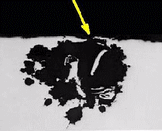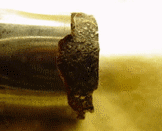The bottom paint is some old stuff a friend gave me for free.
Yes, Hampton gets a lot of fouling.
At our marina, everyone I talk to has just painted the same paint on the running gear as the bottom.
And never have I heard doing that caused them trouble.
I just do what they did.
If you coat the metal with waterproofing, it will prevent it from corroding, if it stays dry.
I got no reason to doubt that.
Last summer we dove on the boat, the props had few barnacles, the hull a few.
But I have noticed now there are more now on the hull where I can see .
I can pop them off sitting on the swim platform pretty easy.
This boat is mostly for short day trips into the bay, like a picnic boat, not cruising.

 I have had zincs last multiple seasons and then only 1/2 of a season due to changes in local boats, being at a different dock, or who knows what. Make sure that you have no wires hanging in your bilge water. A very common problem that will cause your zincs to disappear quickly. Having a few ot more barnacles on the running gear at end of season is also very normal. On and Off hull cleaner (available up the street at Defender) will dissolve them. Use it on the running gear, props, shafts, and the hull to clean the slime. Chip any remaining barnacles off with a putty knife. Replace all zincs and keep an eye on them next year. A diver can do this for you or you can take a quick swim to inspect halfway through the season. If in doubt talk with someone at Crocker’s. Very knowledgeable people there. They can check the bonding or find someone who will if you feel the need to. (I would start with fresh zincs and wait another season) Everything you have described is completely normal. Welcome to crowded marinas and salt water in New England.
I have had zincs last multiple seasons and then only 1/2 of a season due to changes in local boats, being at a different dock, or who knows what. Make sure that you have no wires hanging in your bilge water. A very common problem that will cause your zincs to disappear quickly. Having a few ot more barnacles on the running gear at end of season is also very normal. On and Off hull cleaner (available up the street at Defender) will dissolve them. Use it on the running gear, props, shafts, and the hull to clean the slime. Chip any remaining barnacles off with a putty knife. Replace all zincs and keep an eye on them next year. A diver can do this for you or you can take a quick swim to inspect halfway through the season. If in doubt talk with someone at Crocker’s. Very knowledgeable people there. They can check the bonding or find someone who will if you feel the need to. (I would start with fresh zincs and wait another season) Everything you have described is completely normal. Welcome to crowded marinas and salt water in New England. I have wire brushed my props for years.
I have wire brushed my props for years.
